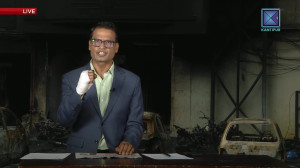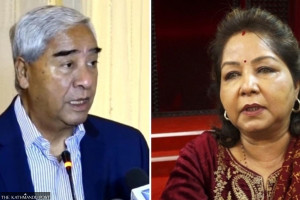Entertainment
All in the Family
Shishir Rana is a film director, actor and producer who has worked in feature films, television serials and advertisements.
What are you working on these days?
I’ve been busy managing things related to my most recent film, Mala. I am one of the producers of the movie, which is currently being screened in theatres around the country.
I’ve also been busy shooting Lootera, in which I have role.
Tell us something about Mala.
Mala is a story about a young woman (played by Priyanka Karki) who lives in a rural area in Nepal. She faces much torture at the hands of her husband and society, and is forced to commit suicide. After her death, her spirit starts haunting those who had mistreated her. Strangely, an atheist doctor, played by Aryan Sigdel, who has never met her is also haunted by the spirit. So the character sets out to uncover the truth.
How has the response been so far?
Mala didn’t do exceptionally well in its first week, but it is slowly picking up. People who watched it liked it, and word-of-mouth publicity is drawing more people to theatres.
People have complimented us on the cinematography of the movie. Pramod Karki has done a great job with his camera. People have also appreciated the artists in the film.
You are also a part of the Mala cast. Tell us about your role in the film.
In the film, my role is that of Aryan’s maternal uncle. Since the movie is quite scary and serious in tone, my character provides comic relief.
Other than your work, what do you like to do whenever you have some time for yourself?
When I am free, I try to write scripts. I also watch films.
What kind of film do you like to watch? (Any favourite actor/ director and why?)
Comedy is my favourite genre. I like to laugh, and I like to make others laugh. Maiti Ghar, Jeevan Rekha, Santan, Kanya Daan, Chino and Saino are some of my favourite films.
Similarly, Rajkumar Hirani is one filmmaker whose films I do not miss out on.
For someone who loves comedy so much, why did you choose to make a horror film?
Bobbie Bhupal, the director, came up to me with Mala’s story. I liked the script because it deals with some serious social issues. So I thought we had to turn this into a film.
Do you look up to anyone as a source of inspiration?
People who work for society greatly inspire me. Personalities like Anuradha Koirala, Dil Sobha Shakya, Madan Krishna Shrestha and Hari Bansha Acharya—I read about them and I realise that there are such good people in our country.
Also, my childhood friend Som Bikram Singh, who is also one of the producers of Mala, has influenced me a lot.
How did you get into the film industry?
My uncle Ravi Shah was an actor and he encouraged me to get into acting. Similarly, artist Shashi Bikram Shah is my grandfather and he too has influenced me. Basically, I was brought up around art. Also, artists like Narayangopal and Prem
Dhoj were friends of my uncles, and they visited us often. We sang songs and had barbeque parties.
It was a very lively environment. Perhaps, that was why I wanted to get into the entertainment industry.
Are you a foodie? What would be your last meal on earth? What about cooking?
I love to eat and I love to cook. My mum was a very good cook and was a writer of recipe books. So I refer to her books and try to cook different dishes. I really miss my mother’s chicken sekuwa, which she used to cook in the oven. And my grandmother used to make amazing mutton meatballs. I have recipes of the dishes, but I cannot replicate the taste. I don’t know about my last meal, but those two dishes are what I crave all the time.
Any memorable incidents from your career that you’d like to share with us.
There are two, actually. The first: It was Mala’s second day of shooting. We were a little off schedule as our vehicle had broken down. We had breakfast very late, at around 2 pm. It was a cold winter day in Nagarkot and Priyanka was telling me that she wasn’t feeling all that great and that her blood pressure was low.
Unfortunately, there was a shot where we had to immerse Priyanka underwater. She was making jokes that she’d pass out and that we’d think she was giving us great shots. But she actually fainted. Fortunately, she was much better the next day and the shooting resumed.
The second incident happened on the last day of Mala’s shooting. Bidya Karki, who plays Mala’s mother in the film, was constantly getting phone calls, but she refused to take them. There were a few scenes left to shoot and once that was done, Bidya didi broke down and started crying. Her husband had expired earlier that day. She knew about it, but didn’t tell us anything. She thought it would hamper the film, so she kept quiet. We felt so bad about the whole thing. Being professional is one thing, but we felt so wrong about keeping her for the shoot.
What is your biggest nightmare? Is there anything you are really scared of?
I am terrified of snakes. When I was in school, there weren’t a lot of houses in Kathmandu and I used to return home walking barefoot through fields. One day, when I was returning home, I came across a snake eating a frog. The snake got scared of the sound that I made and it slid over my foot and went away. It didn’t bite me, but I was bed-ridden for a month.
The sound of aeroplanes is another thing I am really scared of. Whenever I hear the sound of planes, I immediately rush out of my house.
Is there anything you’d want to change about yourself?
I trust people too easily. And because of that, I get hurt pretty bad in case someone is deceitful. I’d like to change that about myself.
I think I am a bit naive and I want to be a little vocal and want to be able to stand up for myself.
If not in this field, what would you be doing?
I can’t even imagine such a scenario. I think I was born to work in films. But if I wasn’t doing this, I’d probably have been forced into joining the army.
Is there anything you’d like to tell people who want to get into the industry?
I would like to say that being in the film industry—and producing, specifically—is not just about investing time and money. A producer has to think about revenue as well.
Research is important, and it is imperative to choose the right director, good artists and a good team. It is also important to understand the business aspect of it—how distributors work and how theatres function. Most importantly, you have got to know your audience.




 19.45°C Kathmandu
19.45°C Kathmandu









